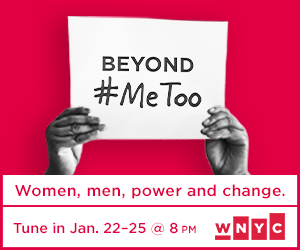Beyond #MeToo
THIS WEEK: WDET is airing a four-part, live program series on next steps in the #MeToo moment.


Sexual harassment and gender discrimination have been met with a grassroots response in the #MeToo moment. In this climate, WNYC is producing Beyond #MeToo, a series of one-hour conversations focused on what we need to do as a society to remedy widespread sexual harassment.
The broadcast event will cover the workplace, corrective responses, how we are raising and educating our children in this environment and how men can play a role in the solution.
Each hour will be driven by deep interview and conversation among hosts and guests. Each segment will also include the voices of engaged listeners from around the country. The guests and their perspectives will be extremely broad and diverse. Listeners can expect to hear from teens and parents, politicians and artists, corporate leaders and blue-collar workers.
MONDAY AT 8P.M.
Episode 1: Designing the Harassment-Free Workplace
Host: Jami Floyd
Focus on both corporate America (Wall Street, Silicon Valley) and Blue Collar Workers. For all the attention given victims and assailants from the entertainment and media worlds, blue collar workers face daily harassment and often have no recourse to correct the abuse. We’ll hear from representatives of Wall Street, Main Street, and the factory floors, as well as workplace experts who can guide us on how to create a safe, respectful and fair work environment.
WEDNESDAY AT 8P.M.
Episode 3: The Corrections
Hosts: Joan Walsh and Brian Lehrer
Crime and punishment, truth and consequences. Is it possible to standardize our responses to sexual harassment, so that we have a more fair and even system of punishment? The wildly uneven responses range from removing a creator’s work from the public sphere (Kevin Spacey, Louis CK) to ignoring their misdeeds (Roman Polanski). Senator Al Franken resigns, Donald Trump is president.
THURSDAY AT 8P.M.
Episode 4: The Men
Host: Kai Wright
Kai Wright hosts a discussion by and with mostly men about the role of men in ending sexual harassment. If men are the problem, they must be part of the solution. How has male behavior changed, and is it consistent with male attitudes? Can change occur voluntarily, or must it be mandated by legal or company policies?
